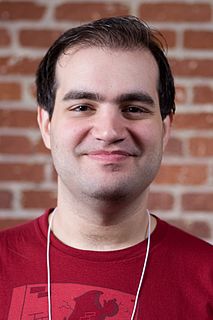A Quote by Adam D'Angelo
In 2007 I was at Facebook, and we looked at some of the social networks in Asia, and they were full of games.
Related Quotes
I think there's confusion around what the point of social networks is. A lot of different companies characterized as social networks have different goals - some serve the function of business networking, some are media portals. What we're trying to do is just make it really efficient for people to communicate, get information and share information.
As a teen-ager I played cards, shot craps, played pool, went to the track, hung around social clubs. I knew that some card and crap games were run by the mob, and some social clubs were mob social clubs. Even as a kid I knew guys that were here today, gone tomorrow, never seen again, and I knew what had happened.
In today's social business marketplace Facebook is one of the best places for nonprofits to be discovered and connect with a larger audience on the basis of shared values. So to get started, a non-profit should launch a Facebook page and invite your existing real world community to connect your cause and their networks.

































